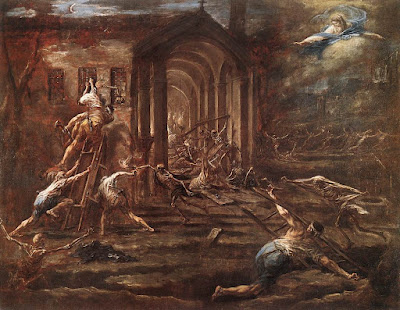(Optional Memorial for Saint Louis of France)
Proper readings for the Memorial of St. Louis
Biographical Information about St. Louis of France
OR
(Optional Memorial for Saint Joseph Calasanz, Priest)
Proper readings for the Memorial of St. Joseph Calasanz
Biographical Information about St. Joseph Calasanz
Biographical Information about St. Louis of France
OR
(Optional Memorial for Saint Joseph Calasanz, Priest)
Proper readings for the Memorial of St. Joseph Calasanz
Biographical Information about St. Joseph Calasanz
 |
| “Sacrilegious Robbery” by Alessandro Magnasco, 1731 |
Readings for Thursday of the Twenty-First Week in Ordinary Time [1]
and Sosthenes our brother,
to the Church of God that is in Corinth,
to you who have been sanctified in Christ Jesus, called to be holy,
with all those everywhere who call upon the name of our Lord Jesus Christ, their Lord and ours.
Grace to you and peace from God our Father
and the Lord Jesus Christ.
for the grace of God bestowed on you in Christ Jesus,
that in him you were enriched in every way,
with all discourse and all knowledge,
as the testimony to Christ was confirmed among you,
so that you are not lacking in any spiritual gift
as you wait for the revelation of our Lord Jesus Christ.
He will keep you firm to the end,
irreproachable on the day of our Lord Jesus Christ.
God is faithful,
and by him you were called to fellowship with his Son, Jesus Christ our Lord.
-------------------------------------------
Commentary on 1 Cor 1:1-9
CCC: 1 Cor 1:1-6 401; 1 Cor 1:2 752, 1695
-------------------------------------------
Responsorial Psalm: Psalm 145:2-3, 4-5, 6-7
and I will praise your name forever and ever.
Great is the Lord and highly to be praised;
his greatness is unsearchable.
R. I will praise your name for ever, Lord.
Generation after generation praises your works
and proclaims your might.
They speak of the splendor of your glorious majesty
and tell of your wondrous works.
R. I will praise your name for ever, Lord.
They discourse of the power of your terrible deeds
and declare your greatness.
They publish the fame of your abundant goodness
and joyfully sing of your justice.
R. I will praise your name for ever, Lord.
-------------------------------------------
Commentary on Ps 145:2-3, 4-5, 6-7
CCC: Ps 145:3 300
-------------------------------------------
Gospel: Matthew 24:42-51
“Stay awake!
For you do not know on which day your Lord will come.
Be sure of this:
if the master of the house
had known the hour of night when the thief was coming,
he would have stayed awake
and not let his house be broken into.
So too, you also must be prepared,
for at an hour you do not expect, the Son of Man will come.
whom the master has put in charge of his household
to distribute to them their food at the proper time?
Blessed is that servant whom his master on his arrival finds doing so.
Amen, I say to you, he will put him in charge of all his property.
But if that wicked servant says to himself, ‘My master is long delayed,’
and begins to beat his fellow servants,
and eat and drink with drunkards,
the servant’s master will come on an unexpected day
and at an unknown hour and will punish him severely
and assign him a place with the hypocrites,
where there will be wailing and grinding of teeth.”
-------------------------------------------
Commentary on Mt 24:42-51
In three consecutive verses Jesus tells his disciples he is coming: “Lord will come,” “the thief was coming,” and “the Son of Man will come.” He uses the analogy of a thief (see also 1 Thessalonians 5: 2,4; 2 Peter 3:10; Revelation 3:3; Revelation 16:15) emphasizing the uncertainty of the time (a thief does not announce himself). [4]
In the second section he tells his followers that those who are found to be vigilant will be rewarded at the end of all things, while those who have fallen away will be punished. “This verse [v.44] is the beginning of the second part of Jesus’ eschatological sermon. Now, while the first part dealt with the certainty of the Second Coming and some of its attendant phenomena as well as with the treatment that Christ’s disciples can expect from the world, the second part that begins here exclusively addresses how the disciples themselves ought to live as they await the Parousia and on the basis of what principles they will be judged.” [5]
CCC: Mt 24:44 673
-------------------------------------------
Reflection:
[1] The picture is “Sacrilegious Robbery” by Alessandro Magnasco, 1731.
[2] S.S. Commemoratio
[3] The readings are taken from the New American Bible, with the exception of the psalm and its response which were developed by the International Committee for English in Liturgy (ICEL). This republication is not authorized by USCCB and is for private use only.
[4] Fire of Mercy Heart of the Word Volume III, Erasmo Leiva-Merikakis, Ignatius Press, San Francisco, CA, © 2012 p. 742.
[5] Ibid. p. 751.
No comments:
Post a Comment